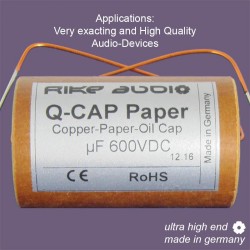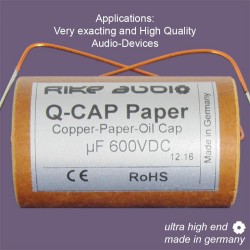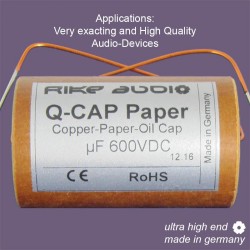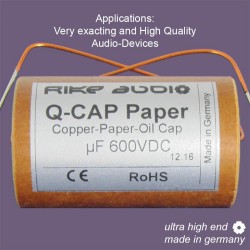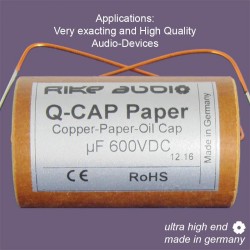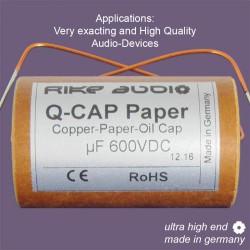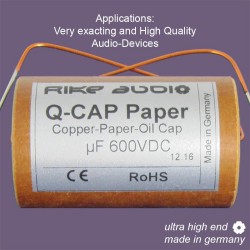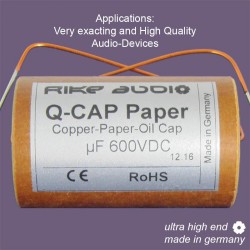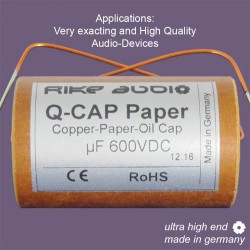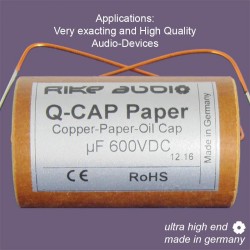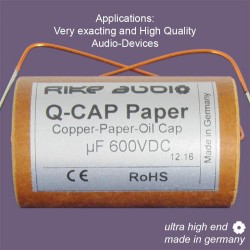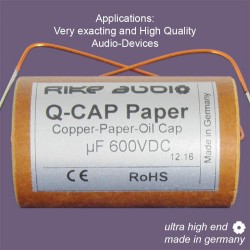






No products
Prices are tax included

audiohobby
Rike Audio Q-CAP2 PIO Copper Paper Oil capacitors
- Lundahl transformers
- Lundahl Tube output
- Lundahl Moving coil input
- Lundahl Input and DC-free line output application
- Lundahl Anode chokes, interstage and line output
- Lundahl Mains transformers
- Lundahl Chokes for tube amp power supply or filament current supply
- Lundahl General purpose
- Lundahl Microphone transformers
- Lundahl Line input
- Lundahl Line output transformers
- Lundahl Problem solvers
- Lundahl Digital Audio
- Lundahl Transformers for telephone hybrids, for 100V PA systems
- Lundahl Video transformers
- Lundahl Metal Housings
- Lundahl Amorphous core output transformers
- Lundahl other audiophile type transformers
- Capacitors
- Mundorf ECap
- Mundorf MCap
- Mundorf MCap RXF
- Mundorf MCap ZN
- Mundorf MCap SUPREME
- Mundorf MEAI
- Mundorf MEAIO
- Mundorf MESGO
- Mundorf MCap SUPREME silver/oil
- Mundorf MCap SUPREME silver/gold
- Mundorf MCap SUPREME silver/gold/oil
- Mundorf TubeCap
- Mundorf MLytic HV
- Mundorf MLytic AG
- Mundorf MLytyc HC
- Auricap XO
- Jantzen Audio MKT Cap
- Jantzen Audio Cross Cap
- Jantzen Audio Standard Z-Cap
- Jantzen Audio Superior Z-Cap
- Jantzen Audio Silver Z-Cap
- Jantzen Audio Copper Foil Amber Z-Cap
- Jantzen Audio Alumen Z-Cap
- Jantzen Audio SilverGold Z-cap
- Rike Audio S-cap Paper in Oil
- Mundorf Mlytic HC+ (4-pole)
- Mundorf MLytiv HV+ (4-Pin High Voltage Power Cap)
- Mundorf MCap SUPREME EVO
- Mundorf MCap SUPREME EVO Oil
- Mundorf MCap SUPREME EVO SilverGold
- Mundorf MCap SUPREME EVO SilverGold Oil
- Mundorf MLytic AG+
- RIKE Audio Q-Cap Copper Oil Polypropylen Capacitors
- RIKE Audio Oil-Paper-Capacitors - S-Cap 2
- Rike Audio Q-CAP2 PIO Copper Paper Oil capacitors
- Miflex Audio Capacitors
- Coils
- Mundorf M-Coil
- Mundorf M-Coil BV
- Mundorf M-Coil VL
- Mundorf MCoil VNCU ZeroOhm (resin-soaked)
- Mundorf M-Coil LL Hepta Strand
- Mundorf M-Coil CF
- Mundorf M-Coil transformer-core
- Mundorf M-Coil CF transformer-core
- Mundorf M-Coil BV transformer-core
- MCoil VT transformer-core vacuum impregnated
- Mundorf M-Coil CF i-core
- Mundorf M-Coil BV i-core
- Mundorf M-Coil drum-core
- Mundorf M-Coil drum-core BV
- Mundorf M-Coil pin-core
- Mundorf M-Coil rod-core
- Mundorf M-Coil BV rod-core
- Mundorf M-Coil CF rod-core
- Mundorf M-Coil zero-ohm
- Mundorf M-Coil CF silver
- Mundorf M-Coil silver/gold
- Jantzen Air Cored Wire Coil
- Jantzen 13AWG 1,8mm Air Core Coils
- Jantzen 14AWG 1,6mm Air Core Coils
- Jantzen 15AWG 1,4mm Air Core Coils
- Jantzen 17AWG 1,2mm Air Core Coils
- Jantzen 18AWG 1,0mm Air Core Coils
- Jantzen 20AWG 0,8mm Air Core Coils
- Jantzen 21AWG 0,7mm Air Core Coils
- Jantzen 22AWG 0,63mm Air Core Coils
- Jantzen 24AWG 0,5mm Air Core Coils
- Jantzen 26AWG 0,4mm Air Core Coils
- Jantzen 29AWG 0,3mm Air Core Coils
- Jantzen Audio Wax Coil
- Jantzen Iron Cored Coils With Discs
- Jantzen 13AWG 1,8mm Iron Cored Coils with Discs
- Jantzen 14AWG 1,6mm Iron Cored Coils with Discs
- Jantzen 15AWG 1,4mm Iron Cored Coils with Discs
- Jantzen 17AWG 1,2mm Iron Cored Coils with Discs
- Jantzen 18AWG 1mm Iron Cored Coils with Discs
- Jantzen 20AWG 0,8mm Iron Cored Coils with Discs
- Jantzen 21AWG 0,7mm Iron Cored Coils with Discs
- Jantzen 22AWG 0,63mm Iron Cored Coils with Discs
- Jantzen 24AWG 0,5mm Iron Cored Coils with Discs
- Jantzen 26AWG 0,4mm Iron Cored Coils with Discs
- Jantzen 29AWG 0,3mm Iron Cored Coils with Discs
- Jantzen C-Coil - Toroidal Core
- Jantzen Audio Cross Coil
- Jantzen Audio Iron Coil
- Jantzen Audio Iron Coil 13AWG
- Jantzen Audio Iron Coil 14AWG
- Jantzen Audio Iron Coil 15AWG
- Jantzen Audio Iron Coil 17AWG
- Jantzen Audio Iron Coil 18AWG
- Jantzen Audio Iron Coil 20AWG
- Jantzen Audio Iron Coil 21AWG
- Jantzen Audio Iron Coil 22AWG
- Jantzen Audio Iron Coil 24AWG
- Jantzen Audio Iron Coil 26AWG
- Jantzen Audio Iron Coil 29AWG
- Jantzen Audio Litz Wire Wax Coil
- Mundorf MCoil VLCU
- Mundorf MCoil VSCU
- Mundorf MCoil VS iCore (resin-soaked)
- Parts for x-over assembling
- Resistors
- Solder
- Wires, plugs, terminals and more
- Interconnect Cable
- Speaker Cable
- Power Cable
- Phono & Tonarm cables
- Hook up Wire
- DH-Labs connectors
- WBT Connectors
- Mundorf M-Connect LS plugs
- Mundorf M-Connect terminals
- Mundorf M-Connect CF
- Mundorf M-Connect silver/gold SGW
- Mundorf M-Connect NF Plugs
- Jantzen Speaker Terminals
- Jantzen Port Tubes
- Damping Materials
- Waveguides and adapters
- Speaker Spikes
- Jantzen audio cables
- Wattgate Power Connectors
- Speaker grill cloth
- Headphone cable and connectors
- Heatshrinks, braided sleves for DIY cable
- Speaker jumpers and terminal bridges
- Speaker building accessories
- Kimber Kable
- Furutech
- ETI Research connectors
- Oyaide
- RCA Sockets
- AudioQuest
- AudioQuest DAC
- AudioQuest USB Extenders and Adaptors
- AudioQuest Power Cables
- AudioQuest Power Conditioners
- AudioQuest Accessories
- AudioQuest Speaker Cables
- AudioQuest Audio Interconnect Cables
- AudioQuest Subwoofer Cables
- AudioQuest Tonearm Cables
- AudioQuest Turntable Cables
- AudioQuest Vinyl and Headphone Accessories
- AudioQuest HDMI Cables
- AudioQuest USB Cables
- AudioQuest Optical Cables
- AudioQuest Digital Coax Cables
- AudioQuest AES/EBU (Balanced) Cables
- AudioQuest Ethernet Cables (RJ/E)
- AudioQuest SureGrip® Speaker Connectors
- AudioQuest CL3/FT4 In-Wall Rated Bulk Audio Interconnect Cables & Plugs
- AudioQuest Spade, Pin, and Banana Connectors
- AudioQuest Instant Tool-less Connectors (ITC) for Analog-Audio, Mini-Coax, and RG6 Cables on Spools
- AudioQuest CL3/FT4 In-Wall Rated Bulk Speaker Cables
- AudioQuest Bulk Speaker Cables — Not In-Wall Rated
- AudioQuest CL3/FT4 In-Wall Rated Bulk CAT6 and CAT7 Ethernet Cables & Plugs
- Nordost
- Nordost power cords
- Nordost analog Interconnects
- Nordost subwoofer cables
- Nordost iKables
- Nordost BLUE HEAVEN headphone cables
- Nordost Ethernet-HDMI-4K-USB
- Nordost digital Interconnects
- Nordost tonearm cables
- Nordost speaker cables
- Nordost QRT – Audio Enhancers
- Nordost Sort Systems – Resonance Control
- Nordost Bulk-Specialty
- Nordost Accessories-Apparel
- Audience AV
- Power supply cables/accessories
- Kits, DIY and Loudspeaker upgrade kits
- Speaker Drivers
- Tweeters
- Midrange Drivers
- Fullrange
- Coaxial Drivers
- Midwoofer Drivers
- Woofers
- Passive Radiators
- Subwoofers
- Car Audio drivers
- Scan-Speak Discovery
- Scan-Speak Classic
- Scan-Speak Revelator
- Scan-Speak Illuminator
- Seas Prestige
- Seas Excel
- Seas Exotic
- Seas Lotus
- Design by SEAS
- SB Acoustics
- SB Acoustics Tweeters
- SB Acoustics Midrange
- SB Acoustics Midwoofer
- SB Acoustics Woofers
- SB Acoustics Passive radiators
- SB Acoustics Subwoofer
- SB Acoustics Satori
- Accuton
- Audiotechnology
- Mundorf Hi-Fi AMT U Series tweeters
- Speaker driver accessories
- Monitor Audio
- Loudspeakers
- Metrum Acoustics DACs
- Soldering and termination services
- Soundcare spikes
- Hi-Fi and Hi-End equipment
- Mediaplayers
- Amplifiers
- Speakers
- Vinyl Players
- Earthequake Sound Home Audio
- Earthequake Sound Car Audio
- Earthequake Sound Gaming Audio
- Earthequake Sound Pro Audio
- Sonnet digital audio
- Power conditioners and distributers
- Streamers
- Portable headphone amplifiers
- Fuses and fuse holders
- Headphone Amplifiers
- DACs
- CD/SACD-players
- Turntables
- Tonearms
- Accessories
- Plate amplifiers, modules, power supplies
- DIY Amplifier modules
- DSP devices
- Services
- Accuton
- Analog Manufaktur Germany
- Anthem
- Audes
- Audience
- Audiobyte
- AudioQuest
- AudioTechnology
- Bliesma Audio
- Bluesound
- Bryston
- Clearaudio
- DALI
- Dayton Audio
- Denon
- DH-Labs
- Duelund Audio
- Dune HD
- Dynaudio
- Earthquake Sound
- ELAC
- Electrocompaniet
- ETI Research
- Eversolo
- Feickert Analogue
- Ferrum Audio
- Fountek
- Furutech
- Hegel
- Hi-Fi Tuning
- HiVi
- Hypex electronics
- IsoAcoustics
- Jantzen Audio
- Kimber Kable

Rike Audio Q-CAP2 PIO Copper Paper Oil capacitors - new generation of QCAP Paper-In-Oil capacitors
Q-Cap2 (Copper)
This RIKE audio paper-in-oil capacitor reaches the highest standards and is characterized by a powerful dynamic in the entire frequency band. These properties are difficult to find in "normal" capacitors in this quality.
The backgr...
Rike Audio Q-CAP2 PIO Copper Paper Oil capacitors - new generation of QCAP Paper-In-Oil capacitors
Q-Cap2 (Copper)
This RIKE audio paper-in-oil capacitor reaches the highest standards and is characterized by a powerful dynamic in the entire frequency band. These properties are difficult to find in "normal" capacitors in this quality.
The background for more than five years of development of their "own" oil paper/pp capacitors by George Arsin and his team is based on the construction of a german "real" ultra high-end tube Amplifier, the four-part audio RIKE mono tube amplifiers EDZARD with a price tag in the 6-digit Euro range. A beauty in a number of ways, which is in this perfection not yet been announced or seen. Such an ambitious object also requires ultra-perfect components – no doubt about it. And this is of course and in particular true for capacitors. Since there are very well designed capacitors in the market, these just didn't reach the demanded extremely high bar in terms of sound quality. Therefore an experienced "capacitor-engineer" together with Mr. Arsin developed a new generation of oil paper capacitors. Countless listening sessions resulted in a perfect balance of all relevant parameters. Of particular note are the special oils and the art of manufacturing. All Rike Audio Copper Paper-In-Oil capacitors are manufactured in Germany and seamlessly build on to the decades-old tradition of German engineering in this field. The current oil RIKE paper program includes 2 qualities, S-cap 2 (standard capacitors) and Q-Cap (quality capacitors)
Q-Cap review by Humble Homemade Hifi:
Sound: I found the Rike Audio Q-Cap to be neutral with a nice balance between dynamics and smoothness, sort of snappy, tidy and rich at the same. Switching to the Intertechnik Audyn Cap Tri-Reference seems things to sound a little dull, switching back to the Q-Cap brings you closer to what is happening. The Tri-Reference is strictly speaking closer to absolute neutrality. The general overview of the Q-Cap is very good and also has a tad more dynamic expression than the Jupiter Copper-Paper-Wax, which in a direct A-B comparsion has a fraction more flow. The Q-Cap has plenty of detail although not to the same extent and clarity that you get with the Mundorf Supreme Silver Gold Oil. This does make the overall presentation of the Q-Cap more relaxing to listen to. Comparing the Rike Audio Q-Cap with the very neutral (and less expensive) Jantzen Audio Superior Z-Cap you know what you pay the extra for: the Q-Cap produces a bigger image, especially when it comes to things like the width of the sound-stage. Also there is a more convincing placing of the instruments in an orchestra. Vocalists and solo violin stand at the front of the sound-stage. One of the things I listen for when evaluating capacitors is how well the harmonic overtones, which determine the timbre of an instrument, are portrayed. This the Rike Audio Q-Cap does very well. Listening to traditional Chinese guzheng music on 24bit / 96kHz flac's or Armenian duduk ensembles on multi-channel SACD, I got the impression of a very tangible presentation with rich timbres. In direct comparison it made the Mundorf Supreme Silver Gold Oil sound a tad "plastic" in the top most registers of these traditional instruments. On the other hand the Mundorf Supreme Silver Gold Oil did very well with jazz drum-kits, giving ride cymbals and brushes a bit more "edge". In general when the Q-Cap is compared to other copper-foil types, you could say that the other types that use paper between the copper foil could be described as sounding "traditional" and the Q-Cap that uses polyproylene between the copper-foil sounds "modern". Neither is better than the other, just different and it will depend on personal taste and system matching which character you prefer. All in all I quite like the Rike Audio Q-Cap, a welcome newcomer to the top range of capacitors.
Rike Audio Q-CAP2 PIO Copper Paper Oil capacitorsThere are 18 products.
Rike Audio Copper/Paper/Oil Q-CAP2 PIO...
Rike Audio Copper/Paper/Oil Q-CAP2 PIO capacitor 0,01uF 600V, QCapCPIO-0,01
85,40 €In Stock
70,00 € tax excl.***Rike Audio Copper/Paper/Oil Q-CAP2 PIO...
Rike Audio Copper/Paper/Oil Q-CAP2 PIO capacitor 0,022uF 600V, QCapCPIO-0,022
85,40 €In Stock
70,00 € tax excl.***Rike Audio Copper/Paper/Oil Q-CAP2 PIO...
Rike Audio Copper/Paper/Oil Q-CAP2 PIO capacitor 0,033uF 600V, QCapCPIO-0,033
85,40 €In Stock
70,00 € tax excl.***Rike Audio Copper/Paper/Oil Q-CAP2 PIO...
Rike Audio Copper/Paper/Oil Q-CAP2 PIO capacitor 0,047uF 600V, QCapCPIO-0,047
85,40 €In Stock
70,00 € tax excl.***Rike Audio Copper/Paper/Oil Q-CAP2 PIO...
Rike Audio Copper/Paper/Oil Q-CAP2 PIO capacitor 0,068uF 600V, QCapCPIO-0,068
85,40 €In Stock
70,00 € tax excl.***Rike Audio Copper/Paper/Oil Q-CAP2 PIO...
Rike Audio Copper/Paper/Oil Q-CAP2 PIO capacitor 0,1uF 600V, QCapCPIO-0,1
85,40 €In Stock
70,00 € tax excl.***Rike Audio Copper/Paper/Oil Q-CAP2 PIO...
Rike Audio Copper/Paper/Oil Q-CAP2 PIO capacitor 0,22uF 600V, QCapCPIO-0,22
85,40 €In Stock
70,00 € tax excl.***Rike Audio Copper/Paper/Oil Q-CAP2 PIO...
Rike Audio Copper/Paper/Oil Q-CAP2 PIO capacitor 0,33uF 600V, QCapCPIO-0,33
92,72 €In Stock
76,00 € tax excl.***Rike Audio Copper/Paper/Oil Q-CAP2 PIO...
Rike Audio Copper/Paper/Oil Q-CAP2 PIO capacitor 0,47uF 600V, QCapCPIO-0,47
102,48 €In Stock
84,00 € tax excl.***Rike Audio Copper/Paper/Oil Q-CAP2 PIO...
Rike Audio Copper/Paper/Oil Q-CAP2 PIO capacitor 0,68uF 600V, QCapCPIO-0,68
109,80 €In Stock
90,00 € tax excl.***Rike Audio Copper/Paper/Oil Q-CAP2 PIO...
Rike Audio Copper/Paper/Oil Q-CAP2 PIO capacitor 1,00uF 600V, QCapCPIO-1,00
117,12 €In Stock
96,00 € tax excl.***Rike Audio Copper/Paper/Oil Q-CAP2 PIO...
Rike Audio Copper/Paper/Oil Q-CAP2 PIO capacitor 1,5uF 600V, QCapCPIO-1,5
131,76 €In Stock
108,00 € tax excl.***
New products
-

SB Acoustics 5" Satori TeXtreme midrange 4Ohm, MR13TX-4
SB Acoustics 5" Satori TeXtreme midrange 4Ohm, MR13TX-4
283,04 €
232,00 € tax excl.*** -

SB Acoustics 6.5" Satori TeXtreme midrange 8Ohm, MR16TX-8
SB Acoustics 6.5" Satori TeXtreme midrange 8Ohm, MR16TX-8
319,64 €
262,00 € tax excl.*** -

WBT Nextgen Pole terminal, WBT-0707 Cu (1pcs)
WBT Nextgen Pole terminal, WBT-0707 Cu (1pcs). Price for 1 piece.
34,10 €
27,95 € tax excl.*** -

Turntable Firebird, Dr. Feickert Analogue
belt-drive turntable, 3 motors, 2 tonearms quick-release system for...
10 990,00 €
9 008,20 € tax excl.*** -

Turntable Blackbird, Dr. Feickert Analogue
belt-drive turntable, 2 motors, 2 tonearms quick-release system for...
6 590,00 €
5 401,64 € tax excl.*** -

Dr. Feickert Analogue Linear power supply
linear regulated, low noise power supply for DFA turntables and Vitesse,...
899,00 €
736,89 € tax excl.*** -

Dr. Feickert Analogue Vero S Phono-preamplifier
Phono-preamplifier, 6 inputs /2 MM + 2 MC + 2 line-in/, remote control...
4 990,00 €
4 090,16 € tax excl.*** -

Dr. Feickert Analogue Magic Mat
Dr. Feickert Magic Mat Anti-Static Record Mat
99,00 €
81,15 € tax excl.***
-

Furutech High End performance Torque Binding Posts (2pcs/set) for Amp side, FT-818(R)
Furutech High End performance Torque...
428,46 € -10% 476,07 €
351,20 € tax excl.***


